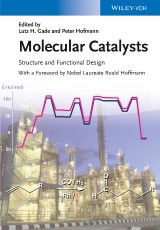Details

Molecular Catalysts
Structure and Functional Design1. Aufl.
|
162,99 € |
|
| Verlag: | Wiley-VCH |
| Format: | EPUB |
| Veröffentl.: | 30.06.2014 |
| ISBN/EAN: | 9783527673292 |
| Sprache: | englisch |
| Anzahl Seiten: | 528 |
DRM-geschütztes eBook, Sie benötigen z.B. Adobe Digital Editions und eine Adobe ID zum Lesen.
Beschreibungen
Highlighting the key aspects and latest advances in the rapidly developing field of molecular catalysis, this book covers new strategies to investigate reaction mechanisms, the enhancement of the catalysts' selectivity and efficiency, as well as the rational design of well-defined molecular catalysts. The interdisciplinary author team with an excellent reputation within the community discusses experimental and theoretical studies, along with examples of improved catalysts, and their application in organic synthesis, biocatalysis, and supported organometallic catalysis. As a result, readers will gain a deeper understanding of the catalytic transformations, allowing them to adapt the knowledge to their own investigations.<br> <br> With its ideal combination of fundamental and applied research, this is an essential reference for researchers and graduate students both in academic institutions and in the chemical industry.<br> <br> With a foreword by Nobel laureate Roald Hoffmann.<br> <br>
Foreword<br> Introduction<br> <br> MECHANISMS OF ELEMENTARY REACTIONS IN CATALYTIC PROCESSES<br> Quantum Dynamics of Molecular Elementary Processes in Catalytic Transformations <br> Activation of Small Molecules with Metal and Metal Oxide Clusters in Inert Gas Matrices<br> Towards Single-Molecule Catalysis<br> Intermediates and Elementary Reactions in Gold Catalysis<br> Diastereoselectivity in Alkene Metathesis<br> <br> NEW CATALYSTS -<br> NEW AND OLD REACTIONS<br> Oxidation Catalysis with High-Valent Nonheme Iron Complexes<br> Single-Site Organochromium Catalysts for High Molecular Weight Polyolefins<br> Ligand Design and Mechanistic Studies for Ni-Catalyzed Hydrocyanation and 2-Methyl-3-Butenenitrile Isomerization Based upon Rh-Hydroformylation Research<br> Strongly Electron Donating Tridentate N-Heterocyclic Biscarbene Ligands for Rhodium and Iridium Catalysis<br> NHCP Ligands for Catalysis<br> <br> CATALYSTS IN SYNTHESIS<br> Ir-Catalyzed Asymmetric Allylic Substitution Reactions -<br> Fundamentals and Applications in Natural Products Synthesis<br> Sequential Catalysis Involving Metal Catalyzed Cycloisomerizations and Cyclizations<br> C-N-Coupling Reactions in Catalytic One-Pot Syntheses using Molecular Group 4 Catalysts<br> Sequential Catalysis for the Stereoselective Synthesis of Complex Polyketides<br> Modular Assembly of Chiral Catalysts with Polydentate Stereodirecting Ligands<br> <br> STRUCTURES AND MECHANISMS IN BIOLOGICAL SYSTEMS<br> Beating and Employing X-Ray-Induced Radiation Damage in Structural Studies of Hemoproteins<br> The Catalytic Strategy of P-O Bond Cleaving Enzymes: Comparing EcoRV and Myosin<br> Selective Hybrid Catalysts Based on Nucleic Acids<br> <br> STUDIES OF IMMOBILIZED CATALYSTS<br> Dendrimers as Platforms for Stereoselective Catalysis<br> Solid Phases as Protective Environments for Biomimetic Catalysts<br> High-Throughput Screening of Catalysts and Reactions<br> <br> Index
<p>"Overall this book gives a very enjoyable overview of many aspects of the highly diverse field of catalysis, as viewed through the lens of the Heidelberg Collaborative Research Centre on molecular catalysis. I am very happy to recommend it to aspiring or established researchers in this area." (<i>AOC</i>, 2016)</p>
Lutz H. Gade holds a chair of inorganic chemistry at the University of Heidelberg (Germany) and is a director of the Institute of Inorganic Chemistry. After completing his PhD with Jack Lewis at Cambridge University in 1991, he joined the Chemistry Department at the University of Wurzburg, where he carried out his habilitation and subsequently worked as a lecturer. In 1998 he moved to the Universite Louis Pasteur (Strasbourg, France) to take up a full professorship in inorganic chemistry and to become the Head of the Laboratory of Organometallic Chemistry and Catalysis. During that time he was a member of the Institut Universitaire de France. Lutz Gade moved to his present position in Heidelberg in October 2003 where he has also been chairman of the collaborative research centre (SFB 623) on molecular catalysis (since 2009) and a member of the steering committee of CaRLa. He is a member of the Heidelberg Academy of Sciences. <br> <br> Peter Hofmann holds a chair and is a director of the Institute of Organic Chemistry at the University of Heidelberg (Germany) since 1995. He is the scientific director of CaRLa, the joint Catalysis Research Laboratory of the University of Heidelberg and BASF SE. He obtained a diploma in chemistry in 1970 and a PhD from the University of Erlangen-Nuremberg (Germany) in 1973. After post-doctoral studies with Roald Hoffmann at Cornell University (USA), he completed his habilitation with Paul v. Rague Schleyer in Erlangen, where he - after a visiting associate professorship at Berkeley in 1979 - became associate professor in 1980. From 1981 until 1983 he held E. O. Fischer's guest chair at the Technical University Munich (Germany) where he was appointed associate professor of Inorganic Chemistry in 1983. He is a recipient of the Emil Fischer medal of the German Chemical Society, a member of the Heidelberg Academy of Sciences and of the North Rhine-Westphalian Academy of Sciences, Humanities and Arts. He initiated the collaborative research centre (SFB 623) on molecular catalysts and was its chairman (2002 to 2009).<br>
Highlighting the key aspects and latest advances in the rapidly developing field of molecular catalysis, this book covers new strategies to investigate reaction mechanisms, the enhancement of the catalysts' selectivity and efficiency, as well as the rational design of well-defined molecular catalysts. The interdisciplinary author team with an excellent reputation within the community discusses experimental and theoretical studies, along with examples of improved catalysts, and their application in organic synthesis, biocatalysis, and supported organometallic catalysis. As a result, readers will gain a deeper understanding of the catalytic transformations, allowing them to adapt the knowledge to their own investigations.<br> <br> With its ideal combination of fundamental and applied research, this is an essential reference for researchers and graduate students both in academic institutions and in the chemical industry.<br> <br> With a foreword by Nobel laureate Roald Hoffmann.<br> <br>


















